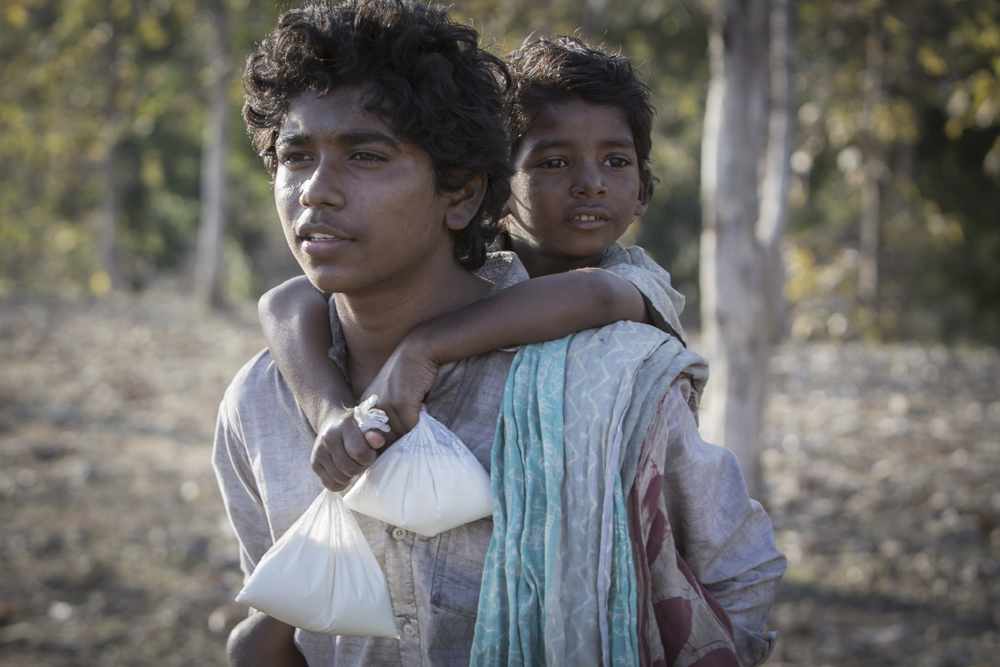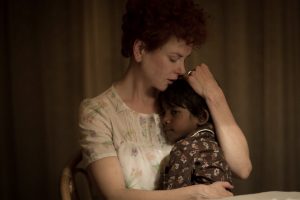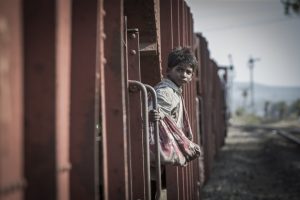 Title: Lion | Rated: PG-13 | Runtime: 120 min | Theaters limited (expanding)
Title: Lion | Rated: PG-13 | Runtime: 120 min | Theaters limited (expanding)
When we follow a character’s journey, his or her emotions and thoughts must be believable and clear if we are to completely emotionally invest in both the character and the journey. This tenet holds true even if that journey spans or skips over a great period of time, in which the character gets older and undergoes change. It most certainly applies to adaptations of extraordinary true stories like Saroo Brierley’s, which is recounted on the big screen in the film Lion. Garth Davis’ picture is a solid production wielding some emotionally stirring punches, yet there’s this sense that it isn’t as extraordinary as the story it seeks to tell – which lies in how it handles the character of adult Saroo.
 Essentially a tale of two halves, the film struggles to find an emotional balance the farther it moves along. The first half takes place in India and follows the child Saroo (Sunny Pawar) as he finds himself separated from his family, who are hundreds of miles away. The second skips ahead by two decades, where the adult Saroo (Dev Patel) – now adopted and residing in Australia – attempts to utilize Google Earth in an effort to be reunited with his family. Davis handles the first half well, as he efficiently imparts the close bonds that Saroo shares with his family and also captures the boy’s loneliness and terror as he traverses the unfamiliar city of Calcutta (now known today as Kolkata) where no one understands his native dialect. It’s the second half where he, along with screenwriter Luke Davies, runs into problems. The prospect of reuniting with his family shakes Saroo, and it affects his relationships with his adopted family and girlfriend Lucy (Rooney Mara). This leads to an emotional turmoil that doesn’t feel genuine, as it basically forces him to act how the script directs him to. At one point, he breaks into a tirade about his peers’ privilege that comes out of nowhere since he never deals with it beforehand. Furthermore, the film doesn’t provide a convincing reason why he keeps his adopted family in the dark about his actions. Quite frankly, the adult Saroo can be rather unlikable, which would be fine if he’s compelling, but he’s not since the drama around him feels so artificial. It’s clear that Saroo’s emotional struggle is meant to stem from an identity crisis he had since getting lost as a child, but the film doesn’t communicate that very well. Perhaps Davies and Garth would fare better had they started the story with the adult Saroo and utilized flashbacks to show his experiences as a child, thus providing a clear, distinct link between his past and his present inner unrest.
Essentially a tale of two halves, the film struggles to find an emotional balance the farther it moves along. The first half takes place in India and follows the child Saroo (Sunny Pawar) as he finds himself separated from his family, who are hundreds of miles away. The second skips ahead by two decades, where the adult Saroo (Dev Patel) – now adopted and residing in Australia – attempts to utilize Google Earth in an effort to be reunited with his family. Davis handles the first half well, as he efficiently imparts the close bonds that Saroo shares with his family and also captures the boy’s loneliness and terror as he traverses the unfamiliar city of Calcutta (now known today as Kolkata) where no one understands his native dialect. It’s the second half where he, along with screenwriter Luke Davies, runs into problems. The prospect of reuniting with his family shakes Saroo, and it affects his relationships with his adopted family and girlfriend Lucy (Rooney Mara). This leads to an emotional turmoil that doesn’t feel genuine, as it basically forces him to act how the script directs him to. At one point, he breaks into a tirade about his peers’ privilege that comes out of nowhere since he never deals with it beforehand. Furthermore, the film doesn’t provide a convincing reason why he keeps his adopted family in the dark about his actions. Quite frankly, the adult Saroo can be rather unlikable, which would be fine if he’s compelling, but he’s not since the drama around him feels so artificial. It’s clear that Saroo’s emotional struggle is meant to stem from an identity crisis he had since getting lost as a child, but the film doesn’t communicate that very well. Perhaps Davies and Garth would fare better had they started the story with the adult Saroo and utilized flashbacks to show his experiences as a child, thus providing a clear, distinct link between his past and his present inner unrest.
 There’s a dependable cast at work here, though the quality of a performance depends on how well-written the character is. Pawar effortlessly brings out child Saroo’s bright personality when in the company of his family, and his large expressive eyes reveal the character’s emotions, though his attempts at physical anguish surprisingly come few and far between. Patel nails the frustration of the brooding adult Saroo and also takes any opportunity to highlight his more lighthearted side. Though the material arguably underserves the actor for most of the film, it does offer him a reprieve in the form of an emotionally charged climax, and he seizes it with gusto. Lucy drifts in and out of the plot, and in no way does she ever come across as a fully realized character. Mara commands the screen at certain moments, but she never quite settles into the story since she’s constantly at the script’s beck and call. As Saroo’s adopted mother Sue, Nicole Kidman quietly radiates gentleness and warmth, and she’s heartwrenching in one particular scene that almost turns the film into a celebration of motherhood. Saroo has two brothers here, with one being his actual brother Guddu (Abhishek Bharate) and the other his adopted brother Mantosh (child played by Keshav Jadhav and adult by Divian Ladwa). Bharate does well by developing an easygoing chemistry with Pawar, though both Jadhav and Ladwa fares about the same as Mara in that Mantosh seems like an afterthought whose arc feels incomplete.
There’s a dependable cast at work here, though the quality of a performance depends on how well-written the character is. Pawar effortlessly brings out child Saroo’s bright personality when in the company of his family, and his large expressive eyes reveal the character’s emotions, though his attempts at physical anguish surprisingly come few and far between. Patel nails the frustration of the brooding adult Saroo and also takes any opportunity to highlight his more lighthearted side. Though the material arguably underserves the actor for most of the film, it does offer him a reprieve in the form of an emotionally charged climax, and he seizes it with gusto. Lucy drifts in and out of the plot, and in no way does she ever come across as a fully realized character. Mara commands the screen at certain moments, but she never quite settles into the story since she’s constantly at the script’s beck and call. As Saroo’s adopted mother Sue, Nicole Kidman quietly radiates gentleness and warmth, and she’s heartwrenching in one particular scene that almost turns the film into a celebration of motherhood. Saroo has two brothers here, with one being his actual brother Guddu (Abhishek Bharate) and the other his adopted brother Mantosh (child played by Keshav Jadhav and adult by Divian Ladwa). Bharate does well by developing an easygoing chemistry with Pawar, though both Jadhav and Ladwa fares about the same as Mara in that Mantosh seems like an afterthought whose arc feels incomplete.
 Mirroring the story, the film’s craft shines in the first half before dropping off in the second. Davis appears inspired when telling child Saroo’s account, as the director assumes his perspective when taking in the world around him. Typically shooting sequences from a low angle, he invites us into Saroo’s mind so we can feel his emotions and understand his reactions, with the cacophony of the Calcutta city life and the swift cuts enhancing the experience immensely. When it comes to the adult Saroo’s perspective, Davis seems short of ideas, which shows in his rather limited range in visually communicating this half of the story. That’s not to say that his direction is terrible for this part, but it feels pedestrian and safe compared to that in the first half. Even the key scenes come across as typical and staged “Hollywood” moments as opposed to ones that unfold organically. Cinematographer Greig Fraser goes wide with its shots, and they effectively impart the scale of the world relative to Saroo in the first half. His use of the God’s-eye view is a nice touch, as it feels like we’re looking at the environment through Google Earth. The score, composed by Hauschka and Dustin O’Halloran, appropriately tugs at the heartstrings.
Mirroring the story, the film’s craft shines in the first half before dropping off in the second. Davis appears inspired when telling child Saroo’s account, as the director assumes his perspective when taking in the world around him. Typically shooting sequences from a low angle, he invites us into Saroo’s mind so we can feel his emotions and understand his reactions, with the cacophony of the Calcutta city life and the swift cuts enhancing the experience immensely. When it comes to the adult Saroo’s perspective, Davis seems short of ideas, which shows in his rather limited range in visually communicating this half of the story. That’s not to say that his direction is terrible for this part, but it feels pedestrian and safe compared to that in the first half. Even the key scenes come across as typical and staged “Hollywood” moments as opposed to ones that unfold organically. Cinematographer Greig Fraser goes wide with its shots, and they effectively impart the scale of the world relative to Saroo in the first half. His use of the God’s-eye view is a nice touch, as it feels like we’re looking at the environment through Google Earth. The score, composed by Hauschka and Dustin O’Halloran, appropriately tugs at the heartstrings.
All in all, Lion is just fine. It diligently recounts Saroo’s story to solid results, yet it doesn’t transform it into a fully fledged cinematic and emotional experience. Does the film live up to said story? Arguably not. Is that necessarily a bad thing? No. It just is what it is.
Rating: 3.5/5.0
* Photos courtesy of The Weinstein Company
